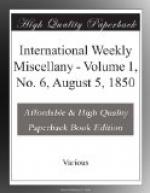“Ferdinand, Ferdinand!” cried Edward, overcome by joy and surprise, and he strove to embrace the well-loved form, but it waved him aside with a melancholy look.
“Ah! you are dead,” continued the speaker; “and why then do I see you just as you looked when living?”
“Edward,” answered the apparition, in a voice that sounded as if it came from afar, “I am dead, but my spirit has no peace.”
“You are not with the blest?” cried Edward, in a voice of terror.
“God is merciful,” it replied; “but we are frail and sinful creatures; inquire no more, but pray for me.”
“With all my heart,” cried Edward, in a tone of anguish, while he gazed with affection on the familiar features; “but speak, what can I do for thee?”
“An unholy tie still binds me to earth. I have sinned. I was cut off in the midst of my sinful projects. This ring burns.” He slipped a small gold ring from his left hand. “Only when every token of this unholy compact is destroyed, and when I recover the ring which I exchanged for this, only then can my spirit be at rest. Oh, Edward, dear Edward, bring me back my ring!”
“With joy—but where, where am I to seek it?”
“Emily Varnier will give it thee herself; our engagement was contrary to holy duties, to prior engagements, to earlier vows. God denied his blessing to the guilty project, and my course was arrested in a fearful manner. Pray for me, Edward, and bring me back the ring, my ring,” continued the voice, in a mournful tone of appeal.
Then the features of the deceased smiled sadly but tenderly; then all appeared to float once more before Edward’s eyes—the form was lost in mist, the monument, the fir-grove, the moonlight, disappeared; a long, gloomy, breathless pause followed. Edward lay, half sleeping, half benumbed, in a confused manner; portions of the dream returned to him—some images, some sounds—above all, the petition for the restitution of the ring. But an indescribable power bound his limbs, closed his eyelids, and silenced his voice; mental consciousness alone was left him, yet his mind was a prey to terror.
At length these painful sensations subsided—his nerves became more braced, his breath came more freely, a pleasing languor crept over his limbs, and he fell into a peaceful sleep. When he awoke it was already broad daylight; his sleep toward the end of the night had been quiet and refreshing. He felt strong and well, but as soon as the recollection of his dream returned, a deep melancholy took possession of him, and he felt the traces of tears which grief had wrung from him on his eyelashes. But what had the vision been? A mere dream engendered by the conversation of the evening, and his affection for Hallberg’s memory, or was it at length the fulfillment of the compact?




